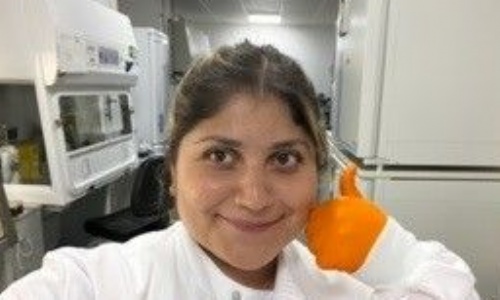Lecture series
Another great lecture for our Sixth Form students.

Lecture by Dr Bermudez on immunology research.
On Thursday 7th December, Year 12 students were lucky to be given a lecture by Dr Bermudez, on her experience doing a PhD at King's College London on immunology, and her undergraduate Biomedical course at Queen Mary’s.
She gave us an overview of her PhD thesis titled “Defining the cellular and molecular mechanisms underlying immune checkpoint inhibitor-induced immune-related adverse events” and how harnessing the immune system via immunotherapy helps to target and eliminate cancer cells. The latter marks an ideal shift in cancer treatment, advancing further from traditional treatment methods, like radiation and chemotherapy.
During the course of Dr Bermudez’s PhD, she played a pivotal role in leading the development of immunotherapy by delving into the complexities of the immune system and its interaction with cancer and exploring ways to enhance the body’s natural ability to recognize and attack cancer cells while minimising damage to healthy tissues.
A great inspiration for Dr Bermudez were the Nobel Prize winners, James Allison and Tasuku Honjo’s groundbreaking research on cancer therapy. Their research led to treatments which can target proteins present on some immune system cells that act as a “brake” on the immune cells that are responsible for killing cancer cells (immunotherapy). James Allison and Tasuku Honjo, won their prize the same day that Dr Bermudez began her PhD at King’s and was something she found to be an incredible motivator as she began her research in immunology.
She talked about the pros and cons of doing a PhD while setting realistic expectations on the long hours but also the variety of benefits. For example, the ability to contribute to science and how that work will stay within the field for several hundreds of years to come.
In response to the question on how Dr Bermudez came to choose her research topic, she mentioned she was intrigued by how the body's own immune cells have the ability to target our own cancerous cells, and the critical importance and power that our immune cells hold. One in two people will get cancer in their lifetime and Dr Bermudez wanted to have a large impact on such a prevalent issue.
Dr Bermudez was looking at metastatic melanoma prior in 2011. We saw from a graph with patients diagnosed with stage 4 metastatic melanoma, who did not receive vital chemotherapy had a median survival rate of only six months. With chemotherapy, the survival rate increased only slightly. However, with the immune checkpoint inhibitors (monoclonal antibodies), 52% of patients survived for 5 years after diagnosis and 10% survived 10 or more years after their diagnosis (Larkin et al 2022).
Monoclonal antibodies are artificially engineered proteins designed to precisely target specific molecules on cancer cells. By mimicking the immune system’s ability to recognize and attack foreign invaders, monoclonal antibodies act as weapons in the journey to eradicate cancerous cells. An advantage of monoclonal antibodies is their specificity. Unlike conventional chemotherapy, which can harm healthy cells along with cancerous ones, monoclonal antibodies are tailored to seek out and bind to specific proteins on the surface of cancer cells or immune cells. This precision not only enhances their effectiveness but also minimises collateral damage to healthy tissues.
In the vast array of cancer treatments that already exist, checkpoint inhibitors have emerged, offering a targeted and specific strategy to increase the body’s intrinsic defences to fight cancers. As scientists delve deeper into understanding the nuances of immune responses, the work of checkpoint inhibitors inspires hope for a future where the immune system stands as a force in the ongoing fight against cancer.
Overall our students interested in research and medicine were given a fascinating insight and Dr Bermudez clearly inspired them!
Article written by Mithraya and Shraddah.
